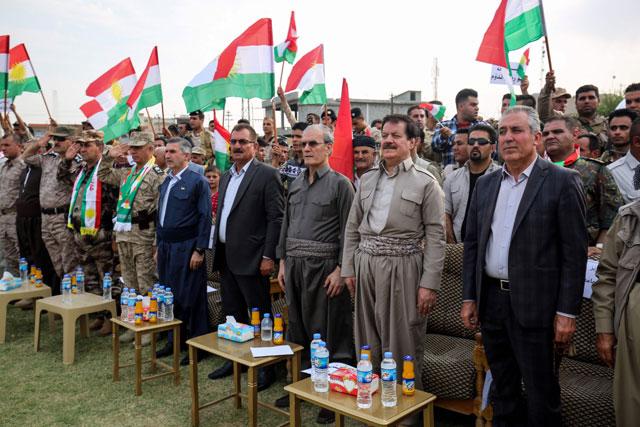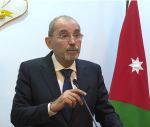You are here
Iraq fires new salvo in political row with Kurds
By AFP - Nov 20,2017 - Last updated at Nov 20,2017

This file photo taken on September 22 shows Iraqi Kurds flying Kurdish flags during an event to urge people to vote in the independence referendum in Erbil (AFP photo)
BAGHDAD — Iraq’s top court on Monday declared the Kurdish north’s independence referendum in September to be unconstitutional, firing a new salvo in the political crisis with the autonomous region.
The legal move marked the latest stage in the dispute between Baghdad and Kurdish regional capital Erbil sparked by the referendum, which resulted in a resounding “yes” vote for independence in the Kurdish area.
A statement said the Supreme Court “rendered a decision declaring unconstitutional the referendum held on September 25, 2017 in Iraqi Kurdistan... and cancelling all the consequences and results”.
Last week, as the deadline announced by the court for its decision on the constitutionality of the referendum approached, the Kurdistan government said it “respected” the decisions taken by Iraq’s highest court.
It also said it respected a previous decision on Article 1 in the constitution insisting on Iraqi unity, which could be a basis for dialogue.
On Monday, the court again cited this article in its ruling, saying that the holding of the Kurdish independence referendum “contradicts and contravenes it”, its spokesman Ayas Al Samuk said in the statement.
Parliament in Baghdad is currently reviewing the federal budget for the coming year, including the allocation for the Kurdish region.
Kurdish premier Nechirvan Barzani at a press conference in Erbil denounced the court’s “unilateral” decision taken without consulting representatives of the autonomous region.
He also said he was “ready for dialogue” with Baghdad.
Earlier Abdel Salam Barwari, a former deputy and member of former Kurdish leader Massud Barzani’s Kurdistan Democratic Party, also rejected it.
“It was a predictable decision given the past of this court and the fact that it has now become a political tool,” he told AFP.
In Baghdad, Prime Minister Haider Al Abadi hailed the court decision, saying his government “rejected this referendum and refused to have anything to do with it”.
Severe repercussions
Last month, the UN Security Council urged the Iraqi government and regional leaders in Kurdistan to set a timetable for talks to end the crisis.
The world body’s appeal came after Baghdad dismissed an offer from Iraqi Kurdish leaders to freeze the outcome of the referendum and hold talks.
Rejecting the freeze offer, Abadi instead demanded the annulment of the independence vote.
September’s referendum was initiated by Barzani, for whom the repercussions were severe.
At the end of October he announced he was stepping aside, having lost almost all of the territory disputed between Erbil and Baghdad.
On October 16, Iraqi government and paramilitary forces had moved in to take over all of the disputed areas.
Under the constitution, these areas come under the central government in Baghdad, with their status to be discussed in future negotiations.
The Kurds also lost all of the oil resources in Kirkuk province that could have ensured the viability of a hypothetical Kurdish state.
Since the US-led invasion of Iraq in 2003 and in the wake of the chaos created in 2014 by a sweeping Daesh group offensive, Kurdish peshmerga forces had filled a security vacuum in the north.
But in the space of just two weeks, Baghdad retook control of almost all of these areas with the aim of returning to the “blue line” of 2003, limiting Iraqi Kurdistan to the three northern provinces of Dohuk, Erbil and Sulaimaniyah.
The two sides also took part in a tit-for-tat wave of arrest warrants aimed at respective political and military figures.
The Kurds issued warrants for 11 Iraqi figures, and a Baghdad court did the same for the organisers of the referendum and the vice president of Iraqi Kurdistan.
The crisis with the Kurdish areas came with Baghdad also battling to rid the country of the remnants of the extremists who had dug in after their lightning campaign three years ago swept across swathes of neighbouring Syria and Iraq.
Related Articles
PARIS/BAGHDAD — French President Emmanuel Macron on Saturday called on Iraq to dismantle all militias, including the government sanctioned I
BAGHDAD — Iraqi Prime Minister Haider Al Abadi met Kurdish regional government counterpart Nechirvan Barzani for the first time on Saturday
ERBIL, Iraq — An Iraqi Kurdish plan to hold a September 25 independence referendum, which has hit a legal roadblock with just a week to go,

















